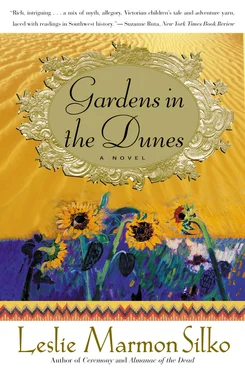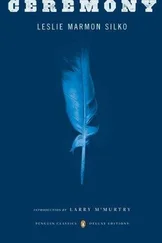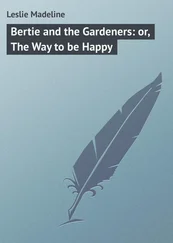Hattie felt a bit melancholy. Surely it was travel fatigue and nothing more. At the height of the previous episode, she scarcely had the energy to walk from her bed to the commode. Right now, a walk in the garden might be just what she needed; she called out to them to wait. She strode across the lawn, testing her energy to reassure herself she was fit.
The sun was behind the hills, but the trees along the river were still bright in the twilight’s glow. She joined them and followed Aunt Bronwyn and the child with her parrot through a weathered brassbound gate in the high limestone wall off the south wing of the old cloister. Inside they found themselves surrounded on all sides by high stone walls overgrown with old grapevines knotted thick as fists. Stone walks crisscrossed the big enclosure that was divided by high walls into four gardens — Indigo was reminded of a big house without a roof. At the center was a round stone pool fed by water bubbling up from a spring.
Aunt Bronwyn explained at one time the entire area had been devoted to vegetables to feed the Norman nuns, but Aunt Bronwyn didn’t need all those vegetables. Now only the sunny southeastern quadrant was planted for the kitchen. The beds were slightly raised above the stone paths that separated them. Flat smooth river stones set side by side upright formed the borders of the beds and gave what Hattie thought was an oddly formal appearance to the vegetable garden. Aunt Bronwyn took pride in old flagstone paths and raised beds and parterres that lay buried under the turf until she hired workmen to unearth them. In old church records she found maps and diagrams of the original cloister garden, its severe plain lines and sparse plantings designed to mortify the soul.
Indigo called out excitedly and ran to the corn plant: she was delighted to see baby pumpkins as well. Aunt Bronwyn took her garden trowel and dug little carrots for the parrot; she picked ripe tomatoes for them to eat while they helped Aunt Bronwyn fill her apron with baby peas and tender spinach for dinner.
The kitchen garden was the modern garden as well, she explained. Plants from all over the world — from the Americas, tomatoes, potatoes, pumpkins, squash, and sweet corn; and garlic, onions, broad beans, asparagus, and chickpeas from Italy — grew with peppers from Asia and Africa.
She led them down the stone path to the northeast quadrant, under a rustic stone pergola that supported a flourishing gourd plant, its pendulous fruits dangling overhead like lanterns. Hattie remarked that this was a good idea to try in Riverside, where shade was always welcome. She explained the Riverside gardens were watered and trimmed but otherwise largely neglected since the death of Edward’s father and his mother’s precipitous decline. Aunt Bronwyn nodded sympathetically.
So far the trip had been a wonderful opportunity for gardening ideas — Indigo had a small valise full of carefully folded wax paper packets with the seeds she’d gathered. When they returned to Riverside, Hattie planned to show the neglected gardens they were loved again.
Aunt Bronwyn agreed; if a garden wasn’t loved it could not properly grow! She was an avid follower of the theories of Gustav Fechner, who believed plants have souls and human beings exist only to be consumed by plants and be transformed into glorious new plant life. Hattie had to smile; so human beings existed only to become fertilizer for plants! Edward and her father would have a good laugh at that!
♦ ♦ ♦
Years before, when she first moved into the old cloister, Aunt Bronwyn joined the Antiquity Rescue Committee, a local group organized to protect an ancient grove of oaks and yews on a hilltop near a small stone circle. Old churches and old buildings had defenders but few people cared about clumps of old trees or old stones on hilltops. Not long after the hilltop grove was saved, she joined hands with committee members as they made a ring around the upright stone threatened by dynamite in a farmer’s field. Her English neighbors tolerated a good many eccentricities in one another, but the demonstration by the rescue committee to save the boulder earned their group some notoriety in Bath and the surrounding area.
She learned a great deal from the old women and old men who tottered up the stairs of the old Pump House Hotel on the second Saturday afternoon of each month. For many members, the meeting of the Antiquity Rescue Committee was their only social activity other than church or visits from doctors. Aunt Bronwyn smiled and shook her head. They were all gone now, but it had been wonderful to hear the history and tales about Bath and the surrounding countryside from these fervent defenders of old trees and stones.
Aunt Bronwyn paused to apologize for going on so about her committee, but Hattie was eager to hear more, and Indigo nodded enthusiastically. Aunt Bronwyn clapped her hands with a big smile. “All right,” she said, “I’ll tell you about the toads!” Some of the rescue committee members were also active in the protection of the toads during their odd migrations; Aunt Bronwyn joined them on their hands and knees in the mud to help the toads cross busy roadways safely. But it wasn’t until she began to study the artifacts of the old Europeans that she discovered carved and ceramic figures of toads were worshiped as incarnations of the primordial Mother.
She imagined the reactions of her English neighbors to her participation in such activities. How typical of an American! they’d say, although she was the only American in the group; all the other members were English, and many grew up in Bath or nearby towns. Her English neighbors enjoyed hearty laughs over the odd pilgrims and foreigners who trudged through town muttering about solstices and stone rings on their way to Stanton Downs or Avebury, and claimed descent from Celtic kings and druids.
Most rescue committee meetings eventually trailed off into reminiscences and stories — how rotund Queen Anne went bottom-up when her carriage overturned on one of Bath’s steepest hills; how Lord Chesterfield preferred to play with card sharps rather than with English gentlemen because the card sharps paid him at once if he won, while the gentlemen sent around a letter and apologies and never paid him. Sometimes after the meetings adjourned they continued lively discussions well into the evening, exchanging stories about the behavior of certain stones that walked to drink water after midnight and stones that turned to follow the sun.
If plants and trees had individual souls, then Aunt Bronwyn decided to acquaint herself with as many different beings as possible. Between the orchard and the cloister odd mounds of broken stone and rubble overgrown with weeds, wild roses, and hawthorn marked the site of the Norman abbey. Here she planted her “wild grove” of silver firs, Scots pines, and yews with black walnut, hazel, and oak. Now, fifty years later, her wild grove reached the back wall of the old cloister garden and shaded the back of the south garden.
A path of pea-size river pebbles curved away from the driveway into the wild grove. Indigo ran ahead on the path with the parrot on her shoulder flapping his wings in excitement; with each breath she could almost taste the damp coolness of the grove.
At the center of the grove was a low circular wall of old stone, overgrown with velvety green mosses and delicate ferns. The water, bubbling and gurgling into itself from an artesian spring, was almost hidden by watercress, moneywort, bog orchids, and yellow iris. After some effort in the local archives, Aunt Bronwyn determined the spring and old wall were the remains of the Norman baptistry.
Indigo offered the parrot a chance to get off her shoulder and walk on the edge of the old wall but the bird nervously scanned the sky and the grove and remained firmly on her shoulder. Indigo told the bird to hold on as she leaned down to taste the water. Nowhere had she found water that tasted as good as the water from the spring at the old gardens. Just then Hattie called out, “Wait,” but Aunt Bronwyn said it was safe; the water tasted just like rainwater, so light and sweet it barely quenched her thirst.
Читать дальше












